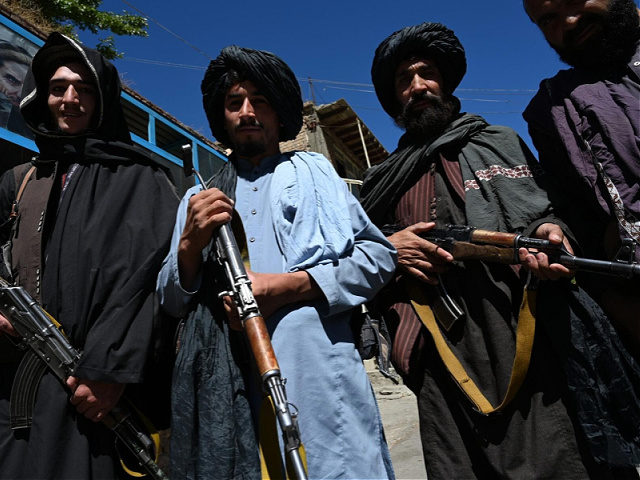The “foreign ministry” of the Taliban urged the United States Congress in an open letter published Wednesday to unfreeze Afghan government assets to allow them to govern effectively, asserting that they are a “united, responsible and non-corrupt government.”
Among the various reasons “Foreign Affairs Ministry” spokesman Abdul Qahar Balkhi listed for why Congress should support funding the Taliban were the “Doha agreement” brokered between the Taliban and the government of President Donald Trump last year, the upcoming winter, and the coronavirus pandemic.
The Taliban took over Afghanistan in August after President Joe Biden openly violated the agreement by extending the 20-year Afghan War through the second half of this year. The Trump administration had agreed to withdraw all U.S. troops from the country by May 1. In response to Biden, the Taliban launched a nationwide campaign to retake federal power, sending the U.S.-backed government fleeing out of Kabul and leaving a power vacuum.
In response to the Taliban takeover, the United States froze Afghan government assets – as did major financial institutions like the World Bank and International Monetary Fund (IMF), citing human rights considers with the terrorist organization and the fact that they did not represent a legitimate Afghan government. Rogue regimes like China, Russia, and Iran have enthusiastically supported unfreezing assets and investing in the Taliban regime.
Balkhi posted a video on Twitter reading the open letter – signed by “acting foreign minister” Amir Khan Muttaqi – in English, which states that, as former President Ashraf Ghani fled the country, the Taliban replaced the federal government “at the request of the people” and is, as such, a legitimate government. The Taliban has no elected leaders and has not made any material moves towards a democracy representative of the Afghan people.
د امريکا کانګرس ته پرانستی ليک
Open letter to the US Congresshttps://t.co/9I9cc9bKE5 (پښتو)https://t.co/SM8KAxL2LL (دری)https://t.co/7Z6XUXcx7d (English)https://t.co/ewcmfvfUIN (اردو)@HouseDemocrats @HouseGOP @SenateDems @SenateGOP @congressdotgov pic.twitter.com/8ScbaQyuBu
— Abdul Qahar Balkhi (@QaharBalkhi) November 17, 2021
“The Doha Agreement envisioned positive relations between both countries in the future,” the letter read in part. “We believe that full implementation of the Doha Agreement and commitment to it can open a new chapter of positive relations between both governments and people which is in the interest of both countries.”
The agreement is named after the city where it was signed – the capital of Qatar, where the Taliban maintained “political offices” before its return to power.
The letter emphasized that Taliban jihadists did not consider themselves to be at war with the United States anymore and allegedly wish to establish friendly diplomatic ties with Washington.
“It is quite surprising that with the announcement of the new government, the administration of the United States of America slapped sanctions on the assets of our Central Bank,” the letter continued. “This goes against our expectations as well as the Doha Agreement. The Afghan people, after attaining personal security following decades of war, have a right to financial security.”
“Despite the fact that following the signing of the Doha Agreement in February 2020 we no longer find ourselves in direct conflict with one another nor are we a military opposition, what logic could possibly exist behind the freezing of our assets?” Muttaqi asked in the letter.
“We are of the belief that freezing Afghan assets cannot resolve the problem at hand neither is it the demand of the American people, hence your government must unfreeze our capital,” Muttaqi asserted.
“We are concerned that if the current situation prevails, the Afghan government and people will face problems and will become a cause for mass migration in the region and world which will consequently create further humanitarian and economic issues for the world.”

A Taliban fighter sits in the cockpit of a captured Afghan Air Force aircraft at the airport in Kabul. (Wakil Kohsar/AFP via Getty Images)
The “foreign minister” cited the Chinese coronavirus pandemic as a reason for the U.S. to help the Taliban.
“Moreover, as the cold winter months are fast approaching in Afghanistan, and in a state where our country has been hammered by the corona virus [sic] , drought, war and poverty,” the letter read, “American sanctions have not only played havoc with trade and business but also with humanitarian assistance.”
“Assessments by the United Nations and other humanitarian organizations conclude that if these conditions continue, the Afghans will face a dire situation this winter,” Muttaqi wrote. “The suffering of a child from malnutrition, the death of a mother from lack of health services, the deprivation of a common Afghan from food, shelter, medicine and other primary needs has no political or logical justification, and it is detrimental for the prestige of the government and people of the United States of America because this is a pure humanitarian issue.”
The letter also invited American companies to invest in the Taliban and the government generally to seek diplomatic ties with the Sunni jihadist organization.
“The Islamic Emirate of Afghanistan [the Taliban], as a sovereign and responsible government, is interested in establishing positive relations with all world governments including the American administration,” the letter noted. “Afghanistan now has everything available for growth and development, and the United States of America can also invest in the manufacturing, agriculture and mining sectors of Afghanistan.”
The Afghan news outlet Khaama Press reported that the assets in question total to about $9 billion.
Taliban officials have insisted for months that they do not have enough money to run a federal government and the international community must invest in their success – notably omitting any explanation for what happened to the billions in opium and heroin profits the group is believed to have made while out of power during the last 20 years.
“We need the reconstruction of Afghanistan, the people of Afghanistan need the budget. The [central bank] shall need the budget,” Taliban spokesman Suhail Shaheen told Chinese regime broadcaster CGTN in August.
The Taliban terrorist organization is strutting and bragging that the Biden administration has agreed to provide aid to Afghanistan. https://t.co/5X1hHMUPTY
— Breitbart News (@BreitbartNews) October 12, 2021
“America is a big country, they need to have a big heart,” Muttaqi asserted in September.
“The money belongs to the Afghan nation. Just give us our own money,” Ahmad Wali Haqmal, a spokesman for the Taliban “finance ministry” asserted more desperately last month.
The Taliban, a jihadist terrorist organization, is unlikely to find much sympathy in the U.S. Congress. In August, Sens. Marco Rubio (R-FL) and Rob Portman (R-OH) wrote to U.S. Treasury Secretary Janet Yellen urging the U.S. to lead a global campaign to keep Afghan assets out of Taliban hands.
“The Taliban are sponsors of terrorism who maintain close ties with Al-Qaeda, and therefore they cannot be trusted to distribute money to the Afghan people who desperately need it,” their statement read, “and will instead use any and all funds to actively advance priorities hostile to U.S. interests.”
The Taliban deny ties to al-Qaeda, though they have appointed senior members of the Haqqani Network, a jihadist terror cell with close ties to al-Qaeda, to major government posts.
The Biden administration bizarrely denied ties between the Taliban and the Haqqani Network in August.
Sirajuddin Haqqani, now the Taliban’s “minister of the interior,” wrote a column in the New York Times this year titled, “What We, the Taliban, Want.”
Follow Frances Martel on Facebook and Twitter.

COMMENTS
Please let us know if you're having issues with commenting.